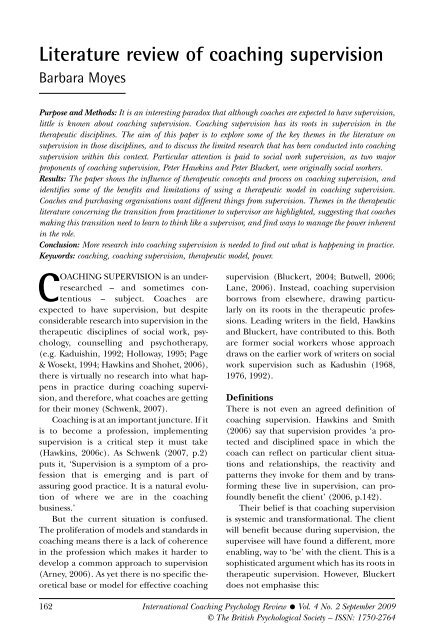International Coaching Psychology Review, 4.2, September 2009
International Coaching Psychology Review, 4.2, September 2009
International Coaching Psychology Review, 4.2, September 2009
You also want an ePaper? Increase the reach of your titles
YUMPU automatically turns print PDFs into web optimized ePapers that Google loves.
Literature review of coaching supervision<br />
Barbara Moyes<br />
Purpose and Methods: It is an interesting paradox that although coaches are expected to have supervision,<br />
little is known about coaching supervision. <strong>Coaching</strong> supervision has its roots in supervision in the<br />
therapeutic disciplines. The aim of this paper is to explore some of the key themes in the literature on<br />
supervision in those disciplines, and to discuss the limited research that has been conducted into coaching<br />
supervision within this context. Particular attention is paid to social work supervision, as two major<br />
proponents of coaching supervision, Peter Hawkins and Peter Bluckert, were originally social workers.<br />
Results: The paper shows the influence of therapeutic concepts and process on coaching supervision, and<br />
identifies some of the benefits and limitations of using a therapeutic model in coaching supervision.<br />
Coaches and purchasing organisations want different things from supervision. Themes in the therapeutic<br />
literature concerning the transition from practitioner to supervisor are highlighted, suggesting that coaches<br />
making this transition need to learn to think like a supervisor, and find ways to manage the power inherent<br />
in the role.<br />
Conclusion: More research into coaching supervision is needed to find out what is happening in practice.<br />
Keywords: coaching, coaching supervision, therapeutic model, power.<br />
COACHING SUPERVISION is an underresearched<br />
– and sometimes contentious<br />
– subject. Coaches are<br />
expected to have supervision, but despite<br />
considerable research into supervision in the<br />
therapeutic disciplines of social work, psychology,<br />
counselling and psychotherapy,<br />
(e.g. Kaduishin, 1992; Holloway, 1995; Page<br />
& Wosekt, 1994; Hawkins and Shohet, 2006),<br />
there is virtually no research into what happens<br />
in practice during coaching supervision,<br />
and therefore, what coaches are getting<br />
for their money (Schwenk, 2007).<br />
<strong>Coaching</strong> is at an important juncture. If it<br />
is to become a profession, implementing<br />
supervision is a critical step it must take<br />
(Hawkins, 2006c). As Schwenk (2007, p.2)<br />
puts it, ‘Supervision is a symptom of a profession<br />
that is emerging and is part of<br />
assuring good practice. It is a natural evolution<br />
of where we are in the coaching<br />
business.’<br />
But the current situation is confused.<br />
The proliferation of models and standards in<br />
coaching means there is a lack of coherence<br />
in the profession which makes it harder to<br />
develop a common approach to supervision<br />
(Arney, 2006). As yet there is no specific theoretical<br />
base or model for effective coaching<br />
supervision (Bluckert, 2004; Butwell, 2006;<br />
Lane, 2006). Instead, coaching supervision<br />
borrows from elsewhere, drawing particularly<br />
on its roots in the therapeutic professions.<br />
Leading writers in the field, Hawkins<br />
and Bluckert, have contributed to this. Both<br />
are former social workers whose approach<br />
draws on the earlier work of writers on social<br />
work supervision such as Kadushin (1968,<br />
1976, 1992).<br />
Definitions<br />
There is not even an agreed definition of<br />
coaching supervision. Hawkins and Smith<br />
(2006) say that supervision provides ‘a protected<br />
and disciplined space in which the<br />
coach can reflect on particular client situations<br />
and relationships, the reactivity and<br />
patterns they invoke for them and by transforming<br />
these live in supervision, can profoundly<br />
benefit the client’ (2006, p.142).<br />
Their belief is that coaching supervision<br />
is systemic and transformational. The client<br />
will benefit because during supervision, the<br />
supervisee will have found a different, more<br />
enabling, way to ‘be’ with the client. This is a<br />
sophisticated argument which has its roots in<br />
therapeutic supervision. However, Bluckert<br />
does not emphasise this:<br />
162 <strong>International</strong> <strong>Coaching</strong> <strong>Psychology</strong> <strong>Review</strong> ● Vol. 4 No. 2 <strong>September</strong> <strong>2009</strong><br />
© The British Psychological Society – ISSN: 1750-2764

















